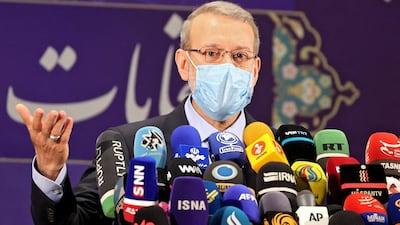Former parliament speaker Ali Larijani registered on Saturday to run in Iran's coming presidential election, becoming the first high-profile candidate to potentially back the policies of the departing administration that reached Tehran's tattered nuclear deal with world powers.
Mr Larijani, long a prominent conservative voice who later allied himself with Iran's relatively moderate President Hassan Rouhani, filed his papers on the last day of registration for the June 18 election.
Although all candidates must be approved by a panel overseen by supreme leader Ayatollah Ali Khamenei, Mr Larijani has maintained close ties to the cleric over his decades in government.
Mr Larijani, a former commander in Iran's paramilitary Revolutionary Guard, previously served as the minister of culture and Islamic guidance and as the head of Iran's state broadcaster.
Under hardline president Mahmoud Ahmadinejad, he served as secretary of Iran's powerful Supreme National Security Council for two years, and as a senior nuclear negotiator. He later became speaker of the Iranian parliament for about 12 years, stepping down in May last year.
Mr Larijani's family includes prominent members of Iran's theocracy, with his cleric brother once serving as the head of the Iranian judiciary. His father was a prominent ayatollah.
Within Iran, candidates exist on a political spectrum that broadly includes hardliners who want to expand Iran’s nuclear programme, moderates who hold on to the status quo, and reformists who want to change the theocracy from within.
Those calling for radical change find themselves blocked from even running for office by the Guardian Council, a 12-member panel that vets and approves candidates under Mr Khamenei’s watch.
“Like outgoing President Rouhani, Larijani is someone Khamenei trusts to represent Iran without compromising the regime’s basic tenets of religious supervision over society and independence from foreign powers,” Barbara Slavin, the director of the Future of Iran Initiative at the Atlantic Council, wrote recently.
A clear candidate has yet to emerge within the reformists. Some mentioned Foreign Minister Javad Zarif, who later said he would not run after a scandal about a leaked recording in which he offered frank criticism of the Revolutionary Guard and the limits of the civilian government’s power.
Hardline contenders
The most prominent candidate to register on Saturday was Iran’s judiciary chief Ebrahim Raisi, a prominent hardline cleric who also took part in a panel involved in the mass execution of thousands of prisoners in 1988.
He ran against Iranian President Hassan Rouhani and lost in the 2017 presidential election, though he still garnered nearly 16 million votes.
Mr Raisi has been named as a possible successor to Mr Khamenei, 82, leading some to suggest he would not run in the race.
However, his registration shows he still has interest in the office he failed to obtain in 2017.
Hardliners have increasingly suggested that a former military commander should be president given the country’s problems, something that has not happened since Iran’s 1979 Islamic Revolution and the purge of the armed forces that followed.
Mr Ahmadinejad, the former hardline president, registered to run on Wednesday. His attempt to contest the 2017 election was blocked after Mr Khamenei criticised him, but the supreme leader has not warned him off this time.

